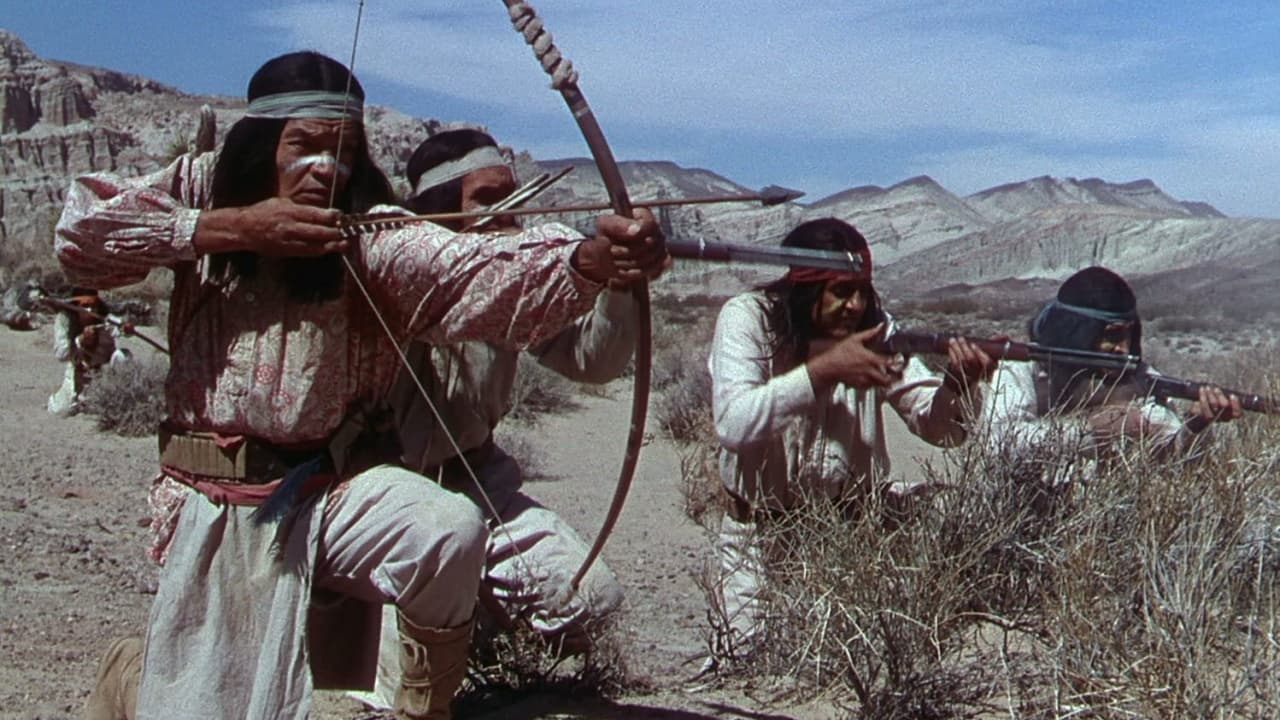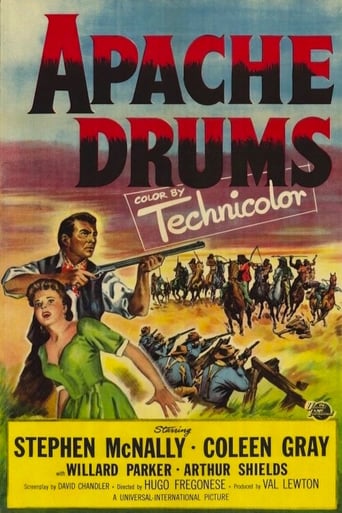Incannerax
What a waste of my time!!!
Borgarkeri
A bit overrated, but still an amazing film
CrawlerChunky
In truth, there is barely enough story here to make a film.
Ezmae Chang
This is a small, humorous movie in some ways, but it has a huge heart. What a nice experience.
peter-2749
This really is a poor film.Whilst the basic story is a typical good old yarn, the performances (with the exception of James Griffith as the Army commander) are very one-dimensional and the characters are hackneyed and do not develop.The production values are also very low and make-up on some of the "Apaches" in the title are more akin to a horror movie than a western, consequently one's mind starts to wander which is not helped by such a pedestrian-paced storyline.And as for direction, there is a literally-laugh-out-loud scene when they sing where you can not only tell that everyone singing is from the Welsh valleys that even the main character does not lip-synch in time. Although there is a slight raising of tension towards the latter parts of the film it is only slight and not really enough to make you have any doubt about the ending.I love westerns and am trying to see as many as I can at the moment but this is one of which I wish I had not bothered wasting an hour and a half of my time.
derekcreedon
During Stanley Baker's elaborate tissue of distortions and downright untruths the defenders at Rorke's Drift break into Men of Harlech as a riposte to their war-chanting opponents despite the fact that they were still an English regiment at the time and the concert never took place anyway. And they sing the song in English, not for the Zulus' benefit presumably but as maybe a concession to the film's American backers. The director Cy Endfield had been an old Hollywood hand until he was blacklisted and it's tempting to wonder if he lifted the idea from an identical scene in what proved to be Val Lewton's final production before an untimely death. I've no idea how true to history is the siege of Spanish Boot by the Mescalero Apaches but the presence of Welsh silver-miners among the population - and they were active in New Mexico and elsewhere - no doubt reflected Lewton's interest in ethnic cultures and traditions. And when the time comes they let rip with Harlech in Welsh which, for a Hollywood movie of its day, is doubly pleasing.Yet another regime-change at RKO had left Lewton out on a limb after his initial run of success and he drifted unhappily between uncongenial assignments at Paramount and MGM before fetching up at little Universal whose budget-restrictions and thematic preferences he found more accommodating. And for the first time he could use Technicolor though the film commences on a dark interior before a door opens onto the outside world (maybe John Ford had been watching it too). Lewton and director Fregonese craft a sturdy morality-tale about an anti-hero who makes good in face of various forms of prejudice. Gambler Sam Leeds (Stephen McNally) kills a man in self-defence but is sent packing as an 'undesirable' along with the local "dance-hall hostesses" whom he later finds massacred after an Indian attack. A notable Lewton touch involves their dying piano-player (Clarence Muse), his scalping concealed under his derby-hat. (Lewton made a point of using black players in impressive cameos e.g. the vivacious Theresa Harris in I WALKED WITH A ZOMBIE and the little page-boy in BEDLAM.) Sam returns to warn the town but is disbelieved until the stagecoach comes back bristling with arrows. A young townsman rides for help but is found mutilated down a well, polluting the water-supply. Sam leads an expedition for replenishments and the hellfire preacher (Arthur Shields) who had spoken against him comes to his aid when the party is attacked. (Shields virtually reprises his role from HOW GREEN WAS MY VALLEY, the Welsh and the Irish usually interchangeable in matters of casting.) The chief Victorio is wounded and the Apaches withdraw for the time being. Back in Spanish Boot Sam is arrested for having given a beer to Pedro-Peter,the cavalry-scout(Armando Silvestre) during the waterless interim and is handcuffed to the bar-rail in the saloon. The town's mayor Joe Madden(Willard Parker) who's also the blacksmith and horse-doctor has an ulterior motive. Both men are rivals for Sally (Coleen Gray) the boarding-house keeper who's torn between love and security. But when the town is finally attacked in force she helps Sam get free and everyone takes refuge inside the church. The Apaches call for aid for their dying chief and Joe elects to go out to them but when Victorio dies they kill him. When night falls the "ghost dancers" - young painted braves deliberately sacrificing themselves for immortality - launch an assault on the defenders through the high windows in a wonderfully-lit and eerie sequence, the miners do their battle-song (one of them is actor and singer Sheb Wooley, later to add to Gary Cooper's woes in HIGH NOON) and the bigoted Reverend finds accord with Pedro-Peter as they pray together to their Great Spirit. As both sides fight fire with fire in the blazing finale the Cavalry arrive in a briskly minimalist wrap-up, Sam and Sally lead the congregation into safety and a pet donkey's newborn foal runs to its mother for milk. Solid and atmospheric with fine leads and an intriguing blend of the familiar and the unusual it rightly pleased Universal who wanted to keep Lewton on board but he decided to accept an offer to join Stanley Kramer. Sadly fate intervened and he never saw the release of his swansong.
huwdj
As I watched this film I could not understand why they kept referring to Arthur Shields as Welsh. This is an actor who has specialised in Irish doctors and priests and who made no attempt to change his accent to play a Welsh preacher. And then came the song, Men of Harlech, in Welsh ! To watch everyone desperately trying to mime to the song was one of the silliest things I've seen in a very long time. Everyone has since seen how well this song can work in Zulu but to drop it into this average Western was decidedly odd. It was as if some one had a song to use and a someone else a script and the two were simply rammed together regardless of the fit.
junk-monkey
There are moments of genius in this movie, though, as the other reviewer says, it is let down by a talky script - and the lamest "the cavalry arrives and that's the end of the movie" in B western history - because that's what happens; after a long drawn out, interestingly shot siege in the church, the cavalry arrives and the movie ends. Just like that. No denouement. The movie just ends. Everyone leaves the church without a backward glance for all the dead and dying loved ones within and there's a cutesy shot of a little donkey trotting up to its mother. It's so weirdly sudden after all the long drawn out, moody, tense, heightened tension that preceded it that it completely whips the metaphorical carpet out from underneath you.The moments of genius though, make what is, after all, a pretty short film worth watching. And a textbook example, like all Lewton's movies, on how less is more, and how to make a small budget go a long way. The scene in the desert where the gun-less anti-hero is riding on to (as he thinks) safety after promising to warn the town is nicely edgy and unsettling. And the low angle shot in the church where the town is burnt casting beams of brilliant red light across the ceiling was great. That one shot was worth the admission price for me.The lighting is terrific, the direction, art direction, and cinematography great - but it's a pity about the script. With a better script - there are no sub-plots or parallel action in the movie - this would have been a classic up there with the likes of Shane, High Noon, and 3:10 to Yuma.Interesting.

